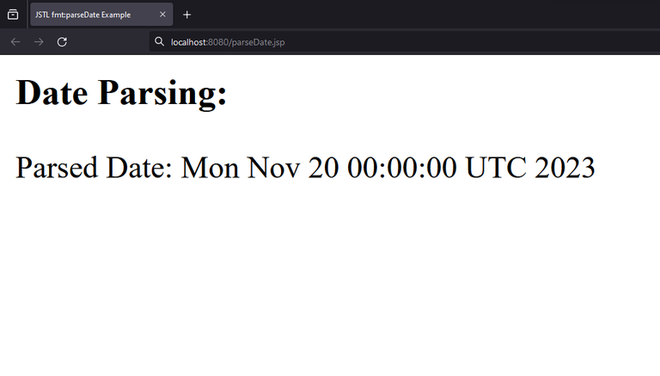JSTL Formatting Tag
Last Updated :
27 Dec, 2023
In JSTL, the formatting <fmt:parseDate> tag is used to parse the date strings into proper java.util.Date objects. This is useful if we need to represent a string in a formatted Date object. Using the tag the tasks of date parsing and formatting can be easily done in Java Server Pages applications.
In this article, we will see the complete information about this tag by exploring the syntax, parameters, attributes, and practical implementation in terms of examples.
Syntax
<fmt:parseDate value="yourDateString"
pattern="yourDatePattern"
var="parsedDate"
/>
Where,
- value: This is the date string we need to parse using the parseDate tag in JSTL.
- pattern: This is the custom pattern that is used for parsing the date string into the Date object.
- var: This is the variable that is used to store the parsed result and can be used later.
Attributes:
The below table describes all the attributes present in the fmt:parseDate JSTL tag.
|
This is the string date value which is to be parsed
|
Yes
|
N/A
|
|
This is the type which can be DATE, TIME, or BOTH
|
No
|
N/A
|
|
FULL, LONG, MEDIUM, SHORT, DEFAULT.
|
No
|
N/A
|
|
FULL, LONG, MEDIUM, SHORT, DEFAULT.
|
No
|
N/A
|
|
This is the locale which is used when parsing the date
|
No
|
Default Locale
|
|
This is used to specify the custom pattern for parsing.
|
No
|
N/A
|
|
This is used to specify the time zone of the parsed date.
|
No
|
Default Time zone
|
|
This is the variable to store the parsed date result.
|
No
|
N/A
|
|
This is used to specify the scope variable to store the format.
|
No
|
Page
|
Example of JSTL Formatting <fmt:parseDate> Tag
This is a example of JavaServer Pages (JSP) code that demonstrates the use of JSTL (JavaServer Pages Standard Tag Library) to format a numeric value using the fmt:parseDate tag.
HTML
<%@ page contentType="text/html;charset=UTF-8" language="java" %>
<html>
<head>
<title>JSTL fmt:parseDate Example</title>
</head>
<body>
<h3>Date Parsing:</h3>
<c:set var="today" value="<%= new java.text.SimpleDateFormat('dd-MM-yyyy').format(new java.util.Date()) %>" />
<fmt:parseDate value="${today}" var="parsedEmpDate" pattern="dd-MM-yyyy" />
<p>Parsed Date: <c:out value="${parsedEmpDate}" /></p>
</body>
</html>
|
Output:

Explanation of the Above Program:
In this example, firstly, the current date is been stored in the today variable. This value is in string type. Then we are performing the parsing of the date stored today using the pattern “dd-MM-yyyy” pattern. We are storing the parsed date in the varibale “parsedEmpDate“. We are lastly displaying these results in web browsers using <h1> and <p> tags.
Share your thoughts in the comments
Please Login to comment...